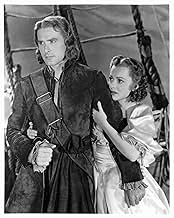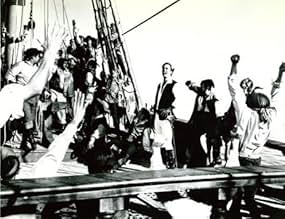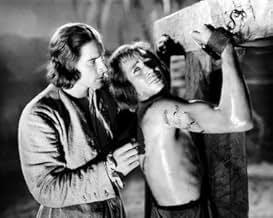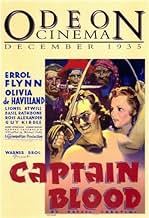NOTE IMDb
7,7/10
17 k
MA NOTE
Après avoir été condamné à tort pour trahison, Peter Blood, un médecin anglais, est envoyé en exil dans les colonies britanniques des Caraïbes, où il devient pirate.Après avoir été condamné à tort pour trahison, Peter Blood, un médecin anglais, est envoyé en exil dans les colonies britanniques des Caraïbes, où il devient pirate.Après avoir été condamné à tort pour trahison, Peter Blood, un médecin anglais, est envoyé en exil dans les colonies britanniques des Caraïbes, où il devient pirate.
- Réalisation
- Scénario
- Casting principal
- Nommé pour 5 Oscars
- 3 victoires et 5 nominations au total
J. Carrol Naish
- Cahusac
- (as J. Carroll Naish)
Avis à la une
Flynn's first starring role in Hollywood! This is a lavish, knock-you-silly gorgeous production with a solid, book-based plot, packed with action, salt water, swordplay AND hordes of pirates "celebrating in pirate fashion" (!). Flynn and de Havilland spark as they spar in the best love-hate mode, and this time, when she inadvisedly condescends to him in his slavery, his pride is as involved as hers. Suave, deadly French pirate captain Rathbone's betrayal of Flynn makes their thrilling, fated-from-the-start duel very satisfying indeed. The icing on the cake -- Flynn at his slim, youthful, sexy freshest, so beautiful he breaks your heart!
I have always wanted to see this film and so I recently purchased the Errol Flynn Signature Collection from Warner Bros. and promptly watched this title. This could easily be considered the greatest pirate movie ever made and by far the most realistic. Being a film student I watched it with a critical eye but at the same time found myself engaged in the excitement and all of the swashbuckling spectacle that WAS the film. Errol Flynn's breakout performance could easily rival his appearance as Robin Hood 3 years later, and Basil Rathbone is his typically evil self. The swordplay is spectacular, the Korngold's score is breathtaking, and the film is not only well made but (after 70 years) easily as entertaining (if not more) as the recent Pirates of the Caribbean. Highly recommended viewing for viewers of all ages.
CAPTAIN BLOOD, Warners' 1935 remake of a popular 1924 silent film, is best remembered today as Errol Flynn's springboard to stardom, and the first of a series of classic swashbucklers from the studio. Yet the film was nearly shelved, and it's story is as entertaining as the film.
Intended to attract the same audience that had made MUTINY ON THE BOUNTY and TREASURE ISLAND box office hits, the film boasted great production values, a talented director (Michael Curtiz), a musical score from Hollywood's greatest composer (Erich Wolfgang Korngold, although time limitations forced him to borrow heavily from Franz Liszt), the captivating beauty of young Olivia de Havilland (in only her fourth film), and, originally, the respected British actor (and future Oscar winner) Robert Donat as physician-turned-pirate Peter Blood. Donat, however, had chronic health problems (which would, sadly, eventually curtail his film career), and Warners faced a major production starting date with no leading man.
Legend has it that Jack Warner's wife recommended young Errol Flynn (just 26 at the time) for the role; she had described him as the most "gorgeous" man she'd ever seen, and helped convince the studio to bring him from England, where he was doing repertory theater, after several years of hell-raising around the world. His largest American role, to date, had been as a corpse in a Perry Mason B-movie, but his sexual conquests and social life were already becoming legendary, and he and new wife, actress Lili Damita, were constantly promoting the young actor around town. The studio finally decided to take a chance on the untested actor in the lead (budget-wise, picking a low-paid contract player was a smart financial move)...but it initially appeared to be a MAJOR blunder, as Flynn looked tense and amateurish in the dailies. Director Curtiz was unfazed, however, and worked with him, and gradually the actor developed confidence. Word spread around the studio that a charismatic new star was emerging, and the first few days' scenes were scrapped and re-shot. By the end of the hugely favorable test screenings, Warners knew it had finally had a bona-fide sex symbol of their own, who could compete for female audiences against Gable, Cooper, and Cary Grant. Errol Flynn had inherited Douglas Fairbanks' title of premier swashbuckler, and had done it with only one film!
CAPTAIN BLOOD may lack the opulence of THE ADVENTURES OF ROBIN HOOD and THE CHARGE OF THE LIGHT BRIGADE, and the pure adventure value of THE SEA HAWK, but without this pirate saga, and the dynamic star it introduced, the 'Golden Age' of Hollywood may never have seen these subsequent classics reach the screen. CAPTAIN BLOOD has earned a place in film history that cannot be underrated.
Intended to attract the same audience that had made MUTINY ON THE BOUNTY and TREASURE ISLAND box office hits, the film boasted great production values, a talented director (Michael Curtiz), a musical score from Hollywood's greatest composer (Erich Wolfgang Korngold, although time limitations forced him to borrow heavily from Franz Liszt), the captivating beauty of young Olivia de Havilland (in only her fourth film), and, originally, the respected British actor (and future Oscar winner) Robert Donat as physician-turned-pirate Peter Blood. Donat, however, had chronic health problems (which would, sadly, eventually curtail his film career), and Warners faced a major production starting date with no leading man.
Legend has it that Jack Warner's wife recommended young Errol Flynn (just 26 at the time) for the role; she had described him as the most "gorgeous" man she'd ever seen, and helped convince the studio to bring him from England, where he was doing repertory theater, after several years of hell-raising around the world. His largest American role, to date, had been as a corpse in a Perry Mason B-movie, but his sexual conquests and social life were already becoming legendary, and he and new wife, actress Lili Damita, were constantly promoting the young actor around town. The studio finally decided to take a chance on the untested actor in the lead (budget-wise, picking a low-paid contract player was a smart financial move)...but it initially appeared to be a MAJOR blunder, as Flynn looked tense and amateurish in the dailies. Director Curtiz was unfazed, however, and worked with him, and gradually the actor developed confidence. Word spread around the studio that a charismatic new star was emerging, and the first few days' scenes were scrapped and re-shot. By the end of the hugely favorable test screenings, Warners knew it had finally had a bona-fide sex symbol of their own, who could compete for female audiences against Gable, Cooper, and Cary Grant. Errol Flynn had inherited Douglas Fairbanks' title of premier swashbuckler, and had done it with only one film!
CAPTAIN BLOOD may lack the opulence of THE ADVENTURES OF ROBIN HOOD and THE CHARGE OF THE LIGHT BRIGADE, and the pure adventure value of THE SEA HAWK, but without this pirate saga, and the dynamic star it introduced, the 'Golden Age' of Hollywood may never have seen these subsequent classics reach the screen. CAPTAIN BLOOD has earned a place in film history that cannot be underrated.
'Captain Blood' made stars of Errol Flynn and Olivia de Havilland when it was released, both winning their roles by default when other casting attempts failed. It's a rousing pirate adventure tale, told as only Rafael Sabatini in his novel could do. Aside from a splendid script, it has Michael Curtiz at the directorial helm and Erich Wolfgang Korngold supplying the stirring background music. The Flynn-de Havilland-Korngold-Curtiz package would be repeated many times by Warner Bros. since the ingredients proved a smash hit, most notably in 'The Adventures of Robin Hood'.
Peter Blood (Errol Flynn) is a physician wrongly accused of being a traitor and sent to the West Indies into a life of slavery. He is purchased at the auction block by a spirited beauty (Olivia de Havilland) whose father happens to be the Governor (Lionel Atwil). When he leads other prisoners in an escape plan and succeeds, he becomes a pirate on the high seas. Eventually he is involved in a fight, a duel to the death with another pirate (Basil Rathbone) in order to win the fair heroine. The climactic duel between Flynn and Rathbone is on par with their other famous duel in 'Robin Hood'.
Fans of either Errol Flynn or Olivia de Havilland cannot fail to enjoy this romantic adventure done in the grand style by a studio that knew it had two future stars in the making.
Peter Blood (Errol Flynn) is a physician wrongly accused of being a traitor and sent to the West Indies into a life of slavery. He is purchased at the auction block by a spirited beauty (Olivia de Havilland) whose father happens to be the Governor (Lionel Atwil). When he leads other prisoners in an escape plan and succeeds, he becomes a pirate on the high seas. Eventually he is involved in a fight, a duel to the death with another pirate (Basil Rathbone) in order to win the fair heroine. The climactic duel between Flynn and Rathbone is on par with their other famous duel in 'Robin Hood'.
Fans of either Errol Flynn or Olivia de Havilland cannot fail to enjoy this romantic adventure done in the grand style by a studio that knew it had two future stars in the making.
This is remembered as Errol Flynn's great opening movie role - which is partly true. He had a nice career in Australian movies (one a film about Fletcher Christian and the Bounty), but CAPTAIN BLOOD was his first Hollywood film as a star, and it was a brilliantly colorful opening role.
Flynn plays Dr. Peter Blood, a physician who is the 1685 version of Dr. Samuel Mudd in the Assassination of Lincoln. Mudd, if you recall, treated John Wilkes Booth's broken leg, and was sentenced to life imprisonment as a result. Flynn treats some injured men not realizing they are soldiers in a revolt. When they are arrested so is he, and he ends up being transported as an indentured servant (little better than a slave) to Jamaica in the West Indies.
The revolt, by the way, is that of James, Duke of Monmouth. The son of one Lucy Walters, his father was supposed to be King Charles II, one of several lovers Walters had when James was born. King Charles had ennobled Monmouth, and treated him well at court, but refused to legitimize him as the Whigs hoped (they wanted the Protestant Monmouth on the throne, rather than the Catholic brother of Charles, James, Duke of York. In the end Monmouth led this ill-fated revolt, which was defeated at the battle of Sedgewick Moor. Monmouth was beheaded at the Tower of London. King James II (the former Duke of York) sent his most belligerent jurist, Judge George Jeffreys to the west country where hundreds were hanged at fast trials (known forever after as "The Bloody Assizes". Jeffreys appears in the film as the judge that orders Blood's transporting to the New World. However in the film Blood (desperate to prove he is just a doctor) says the judge is suffering from tuberculosis. Jeffeys actually suffered from kidney stones, and was a heavy drinker and curser as a result. King James II made him Lord Chancellor for his work.
Flynn's real adventures begin in Jamaica, where he is working at the estate of Colonel Bishop (Lionel Atwill) and his niece Arabella (Olivia De Haviland). It was the first film Flynn and De Haviland co-starred in. Atwill is a bully to these traitorous indentured servants, but Flynn's medical abilities raises him above the others. With the aid of two local doctors he plans an escape, and he and the other indentured servants (Guy Kibbee, Ross Alexander, etc.) escape after defeating a pirate attack on the island. They also have the pleasure of plundering and discomforting Atwill, who vows to hunt them down and destroy them. The only regret Flynn has in leaving is he and Arabella have fallen in love.
We watch the rise of Peter Blood as a leading pirate, his temporary partnership with the French pirate Captain Lavasseur (Basil Rathbone) - which ends in a duel over De Haviland (and the first time Rathbone had to die at Flynn's hand in a duel in their films), and his gradual emergence as a friend of a reformed England represented by Lord Willoughby (Henry Stephenson) after the "Glorious Revolution" of 1688 overthrows James II. Although not exactly the same, Blood's rise from Pirate king to Governor of Jamaica (as the film ends) is a mirror of the story (a decade earlier) of the rise of Pirate, Henry Morgan, to being Sir Henry Morgan, Lt. Governor/Governor of Jamaica. A closer acting job regarding Morgan was done by Laird Cregar in THE BLACK SWAN, where he played that Governor - and with a welsh accent. But Flynn does very nicely, with his charm, humor, good looks, and athletic grace. It was a good introduction to a Hollywood legend.
Flynn plays Dr. Peter Blood, a physician who is the 1685 version of Dr. Samuel Mudd in the Assassination of Lincoln. Mudd, if you recall, treated John Wilkes Booth's broken leg, and was sentenced to life imprisonment as a result. Flynn treats some injured men not realizing they are soldiers in a revolt. When they are arrested so is he, and he ends up being transported as an indentured servant (little better than a slave) to Jamaica in the West Indies.
The revolt, by the way, is that of James, Duke of Monmouth. The son of one Lucy Walters, his father was supposed to be King Charles II, one of several lovers Walters had when James was born. King Charles had ennobled Monmouth, and treated him well at court, but refused to legitimize him as the Whigs hoped (they wanted the Protestant Monmouth on the throne, rather than the Catholic brother of Charles, James, Duke of York. In the end Monmouth led this ill-fated revolt, which was defeated at the battle of Sedgewick Moor. Monmouth was beheaded at the Tower of London. King James II (the former Duke of York) sent his most belligerent jurist, Judge George Jeffreys to the west country where hundreds were hanged at fast trials (known forever after as "The Bloody Assizes". Jeffreys appears in the film as the judge that orders Blood's transporting to the New World. However in the film Blood (desperate to prove he is just a doctor) says the judge is suffering from tuberculosis. Jeffeys actually suffered from kidney stones, and was a heavy drinker and curser as a result. King James II made him Lord Chancellor for his work.
Flynn's real adventures begin in Jamaica, where he is working at the estate of Colonel Bishop (Lionel Atwill) and his niece Arabella (Olivia De Haviland). It was the first film Flynn and De Haviland co-starred in. Atwill is a bully to these traitorous indentured servants, but Flynn's medical abilities raises him above the others. With the aid of two local doctors he plans an escape, and he and the other indentured servants (Guy Kibbee, Ross Alexander, etc.) escape after defeating a pirate attack on the island. They also have the pleasure of plundering and discomforting Atwill, who vows to hunt them down and destroy them. The only regret Flynn has in leaving is he and Arabella have fallen in love.
We watch the rise of Peter Blood as a leading pirate, his temporary partnership with the French pirate Captain Lavasseur (Basil Rathbone) - which ends in a duel over De Haviland (and the first time Rathbone had to die at Flynn's hand in a duel in their films), and his gradual emergence as a friend of a reformed England represented by Lord Willoughby (Henry Stephenson) after the "Glorious Revolution" of 1688 overthrows James II. Although not exactly the same, Blood's rise from Pirate king to Governor of Jamaica (as the film ends) is a mirror of the story (a decade earlier) of the rise of Pirate, Henry Morgan, to being Sir Henry Morgan, Lt. Governor/Governor of Jamaica. A closer acting job regarding Morgan was done by Laird Cregar in THE BLACK SWAN, where he played that Governor - and with a welsh accent. But Flynn does very nicely, with his charm, humor, good looks, and athletic grace. It was a good introduction to a Hollywood legend.
Le saviez-vous
- AnecdotesThe first screen duel between Errol Flynn and Basil Rathbone, which would be reprised three years later (and to grander effect) in Les aventures de Robin des Bois (1938).
- GaffesThe film is set in 1685 and refers to Philip being the king of Spain. Carlos II was king of Spain at this time.
- Citations
Sentry: Pirates! Spanish pirates!
Dr. Peter Blood: This is what I call a timely interruption! Though what'll come of it - the devil himself only knows!
- Versions alternativesOriginally released at 119 minutes, Warner Bros. cut 20 minutes worth of footage from the film for its theatrical reissue in 1951, in order that it could fit onto a double bill with _Sea Hawk, The (1940)_, also trimmed for the same reason. The cut reissue version was also broadcast for many years on television. The film was restored to full length when first released on VHS in the 1980s; this is also the version later released on DVD and now shown on TCM.
- ConnexionsEdited from L'aigle des mers (1924)
- Bandes originalesFugal Episode from Prometheus
(1850, revised 1855) (uncredited)
Composed by Franz Liszt
Adapted and Re-orchestrated by Hugo Friedhofer and Erich Wolfgang Korngold
Meilleurs choix
Connectez-vous pour évaluer et suivre la liste de favoris afin de recevoir des recommandations personnalisées
- How long is Captain Blood?Alimenté par Alexa
- Is this the movie where there is a shipwreck and Flynn is put on trial for shooting people who were trying to climb on to some of the crowded wreckage, which was in danger of sinking?l have looked for this movie for a long time, and this is the only one l can find that looks like it might be the one. Flynn's hairstyle is as l remember from that movie, even though l only ever saw it once, over 50 years ago.
Détails
- Date de sortie
- Pays d’origine
- Site officiel
- Langues
- Aussi connu sous le nom de
- Captain Blood
- Lieux de tournage
- Sociétés de production
- Voir plus de crédits d'entreprise sur IMDbPro
Box-office
- Budget
- 1 200 000 $US (estimé)
- Durée1 heure 59 minutes
- Couleur
- Mixage
- Rapport de forme
- 1.37 : 1
Contribuer à cette page
Suggérer une modification ou ajouter du contenu manquant

Lacune principale
By what name was Capitaine Blood (1935) officially released in India in English?
Répondre






































